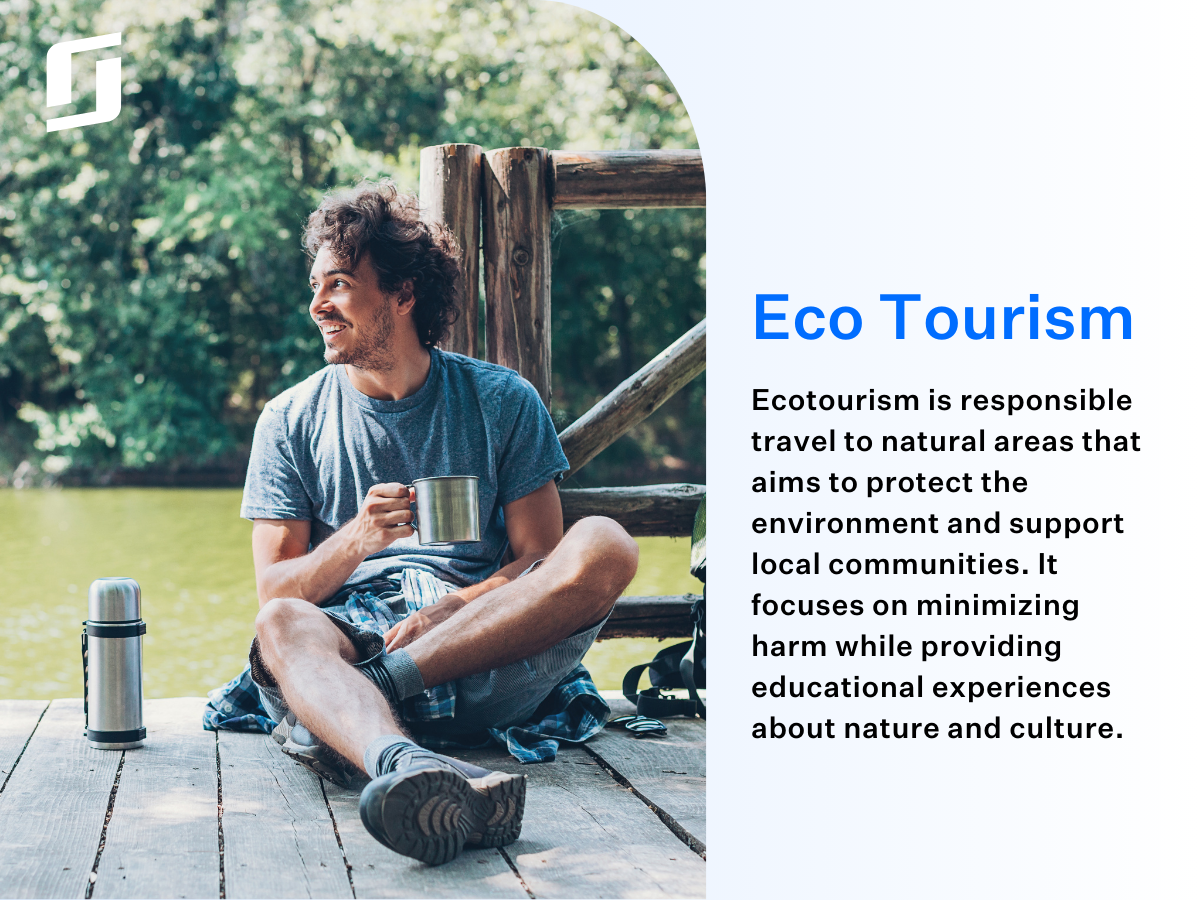What is eco-friendly tourism?
Eco-friendly tourism is a form of travel that minimises environmental impact of the tourism industry, protecting natural resources and supporting local communities.
It can be tricky to define the term ‘eco tourism’ for hotels, because it can mean so many different things. One eco tourism definition focuses on reducing waste, another seeks to maintain local ecosystems, and another again might be focused on the cultural heritage of an area.
But this does mean that hotels have plenty of opportunities in terms of sustainable travel and tourism. And with environmentally friendly tourism becoming a focus for an ever more aware cohort of travellers, ecotourism hotels are setting themselves up for future success.
Why is eco tourism important?
Eco tourism is important for the future of your business, the local community you work within, and without overstating it too much, the planet as a whole.
On a business level it ensures you cater to the growing (and often big spending) group of eco-conscious travellers, and forces you to consider long-term investments in sustainable technologies that can save you big money in the long run.
Planning your eco tourism hotel around the needs and strengths of your local environment and community can help the area grow as a whole, and the broader environmental benefits of this effort, in terms of lower emissions and reduced waste, mean that you’re playing your part in creating a more sustainable, habitable planet.
What is an example of ecotourism?
An example of ecotourism is found at Costa Rica’s Monteverde Cloud Forest Reserve, where hotels have gone to great lengths to integrate seamlessly into the stunning local landscape, and provide tourists with low-impact ways to experience it.
A common question from both hoteliers and guests is whether ecotourism is good or bad for the environment. Despite the name, ecotourism can be harmful if done badly. It’s important to bring a careful, considered approach to these efforts.
In this guide we’ll take a closer look at ecotourism and sustainable tourism for hotels, from how a hotel can be environmentally friendly, to how it can capitalise on opportunities like luxury ecotourism.
Table of contents
Why “eco” hotels are more expensive to operate
Hotels are a business – they exist to provide a service and to make money. But sustainability initiatives rarely represent the cheapest ways to run your hotel. And that makes eco tourism management tricky, as hotel leaders can be forced to balance capital and operational cost considerations with attracting eco-conscious guests and doing the right thing by the environment.
Some of the challenges include:
- Significant upfront investment: Energy-efficient hotel construction, including the energy, water and HVAC systems within, can represent large capital expenditure (although they will pay themselves back over time).
- Sustainable sourcing challenges: You’ll pay more for organic food and fair-trade products, and some hotels might struggle to source these products at all.
- Operational shifts: Certain eco-conscious systems and processes, such as waste reduction, recycling and water conservation efforts, can require more time and effort to run than standard systems.
The good news: sustainable tourism hotels tend to have lower running costs in the long run, particularly renewable energy systems and water conservation systems that minimise waste. Even fair trade, sustainably sourced products can ultimately increase revenue, as they can command a higher markup and generate more profit for your business.
Enhance your sustainability efforts with SiteMinder
The world’s leading hotel platform, SiteMinder, helps you enhance the sustainability of your hotel business by maximising both revenue and operational efficiency.
Learn more
Is it worth targeting the eco-friendly hotel market?
The short answer? Yes. Guests are becoming increasingly aware of the impact that their travel can have on the environment, and many are willing to pay a little more to stay at a hotel that does its part to minimise these effects, thereby offering a guilt-free stay.
But it has to be done the right way.
Eco tourism with sustainable practices for hotels
You can’t just tag yourself as ‘eco-friendly’ without backing that statement up. Capitalising on the eco tourism market is about proving your sustainability credentials by doing, not saying, so you need to implement initiatives before you can talk about them. Speaking of which…
Common greenwashing mistakes hotels make
Greenwashing – overstating or outright lying about your eco tourism credentials – may often be unintentional, but it is quite common across a number of industries. And consumers are becoming wise to it. Be sure to avoid the following:
- Vague claims: “Eco-friendly” should always be paired with specifics on sustainability practices.
- No certifications: A trusted third-party should back up your claims.
- Minimal impact initiatives: Avoid doing things like promoting towel reuse programs while still using single-use plastics.
- Offsetting instead of reducing: Carbon offsets are fast losing credibility. You should instead aim to cut your emissions.
How hotels can prove real sustainability
Mistakes avoided, how do you effectively target the eco-tourism market?
- Obtain recognised eco-certifications: Secure sustainability accreditations from the likes of LEED, Green Key and EarthCheck.
- Publish sustainability impact reports: Aim for total transparency in terms of your water and energy use, and your waste reductions.
- Aim for holistic sustainability: Incorporate eco-friendly processes across all operations. from supply chains to guest experiences.
- Communicate your efforts: Market yourself honestly and openly as an eco-friendly option, and train staff to communicate your green initiatives effectively.

How hotels can attract eco-conscious travellers
Let’s shift our framing. In reality, sustainability shouldn’t be viewed as a cost or an obligation, but rather an opportunity to add value to your guest experience and increase the revenue of your hotel business.
How do you effectively attract sustainability-minded travellers, and make more money in the process? The following strategies are a great place to start.
Create eco-experiences
A secluded retreat in the middle of nature. Permaculture and sustainability workshops. Tours of national parks and local ecosystems. These eco-experiences can be a great way to highlight your knowledge and good work, share your local area, and earn more money while you do it.
Offer optional eco-packages
Eco-conscious travellers may be willing to spend more than your average guest (which is good news if you need to invest in sustainable on-site systems). But rather than just increasing the base rates, and potentially alienating a large portion of other guests, you might consider offering premium eco-packages to those who are willing to pay a little more for an environmentally friendly experience.
Promote sustainable guest behaviours
Introduce green loyalty programs, where you partner with environmental organisations to offer points that contribute to environmental initiatives. Incentivise sustainable guest behaviours by offering discounts or free amenities to guests who opt to reuse towels, decline daily housekeeping or choose energy-efficient room settings. You can also gamify sustainability efforts through apps or in-room challenges around water and energy conservation.
The future of sustainable hotels
What does the future of your eco tourism – and more specifically of your eco hotel – look like? Examples of eco tourism can offer inspiration for your own efforts.
First to some stats. Globally, 73% of tourists prefer hotels with sustainable practices, and 81% plan to choose sustainable options in the near future. It’s an already huge market, and it’s not going backwards.
In terms of your hotel, you’re safe to base your strategic sustainability decisions on the fact that eco-conscious travellers are willing to pay more for a genuinely sustainable experience. This means that ecoluxury stays have significant potential. You could build a standalone room or villa where sustainability is front and centre, and quickly recoup the investment through premium rates.
There’s also tech-driven sustainability: AI-powered smart HVAC, renewable on-site energy generation and water recycling systems that might cost a bit to set up, but that more than pay themselves back over time.
But not all sustainability initiatives require heavy investment – there are budget-friendly green solutions too, like switching to bulk toiletries and minimising single-use plastics.
Another less obvious piece of the hotel sustainability puzzle is maximising your internal resources. When you use automation to lift repetitive, low value tasks from the shoulders of your staff, they have more time to focus on sustainability and the eco-conscious guest experience.
That’s where SiteMinder comes in.

